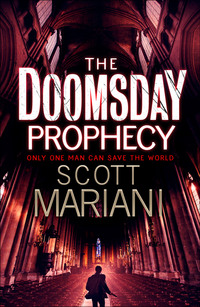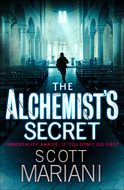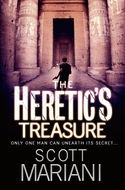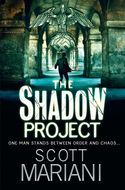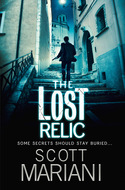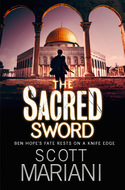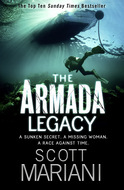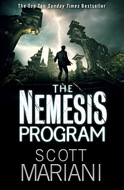Raamatut ei saa failina alla laadida, kuid seda saab lugeda meie rakenduses või veebis.
Loe raamatut: «The Doomsday Prophecy»
SCOTT MARIANI
The Doomsday Prophecy

Copyright

Avon
An imprint of HarperCollins Publishers Ltd.
1 London Bridge Street
London SE1 9GF
This ebook edition published by HarperCollins Publishers 2016
First published in paperback by HarperCollinsPublishers, 2009
Copyright © Scott Mariani 2009
Cover design © Henry Steadman 2016
Scott Mariani asserts the moral right to be identified as the author of this work
A catalogue copy of this book is available from the British Library
This novel is entirely a work of fiction. The names, characters and incidents portrayed in it are the work of the author’s imagination. Any resemblance to actual persons, living or dead, events or localities is entirely coincidental.
All rights reserved under International and Pan-American Copyright Conventions. By payment of the required fees, you have been granted the non-exclusive, non-transferable right to access and read the text of this ebook on screen. No part of this text may be reproduced, transmitted, down-loaded, decompiled, reverse engineered, or stored in or introduced into any information storage and retrieval system, in any form or by any means, whether electronic or mechanical, now known or hereinafter invented, without the express written permission of HarperCollins ebooks
HarperCollinsPublishers has made every reasonable effort to ensure that any picture content and written content in this ebook has been included or removed in accordance with the contractual and technological constraints in operation at the time of publication
Source ISBN: 9781847560810
Ebook Edition © JANUARY 2016 ISBN: 9780007320042
Version: 2019-12-06
Dedication
For Malcolm and Isabelle
‘Blessed is he that readeth, and they that hear the words of this prophecy, and keep those things which are written therein:
For the time IS at hand.’
Book of Revelation 1:3
The Holy Bible
Contents
Cover
Title Page
Copyright
Dedication
Epigraph
Chapter One
Chapter Two
Chapter Three
Chapter Four
Chapter Five
Chapter Six
Chapter Seven
Chapter Eight
Chapter Nine
Chapter Ten
Chapter Eleven
Chapter Twelve
Chapter Thirteen
Chapter Fourteen
Chapter Fifteen
Chapter Sixteen
Chapter Seventeen
Chapter Eighteen
Chapter Nineteen
Chapter Twenty
Chapter Twenty-One
Chapter Twenty-Two
Chapter Twenty-Three
Chapter Twenty-Four
Chapter Twenty-Five
Chapter Twenty-Six
Chapter Twenty-Seven
Chapter Twenty-Eight
Chapter Twenty-Nine
Chapter Thirty
Chapter Thirty-One
Chapter Thirty-Two
Chapter Thirty-Three
Chapter Thirty-Four
Chapter Thirty-Five
Chapter Thirty-Six
Chapter Thirty-Seven
Chapter Thirty-Eight
Chapter Thirty-Nine
Chapter Forty
Chapter Forty-One
Chapter Forty-Two
Chapter Forty-Three
Chapter Forty-Four
Chapter Forty-Five
Chapter Forty-Six
Chapter Forty-Seven
Chapter Forty-Eight
Chapter Forty-Nine
Chapter Fifty
Chapter Fifty-One
Chapter Fifty-Two
Chapter Fifty-Three
Chapter Fifty-Four
Chapter Fifty-Five
Chapter Fifty-Six
Chapter Fifty-Seven
Chapter Fifty-Eight
Chapter Fifty-Nine
Chapter Sixty
Chapter Sixty-One
Chapter Sixty-Two
Chapter Sixty-Three
Chapter Sixty-Four
Chapter Sixty-Five
Chapter Sixty-Six
Chapter Sixty-Seven
The Ben Hope series
Keep Reading
Author’s Note
Acknowledgements
About the Author
Also by Scott Mariani
About the Publisher
Chapter One
Corfu, Greek Islands, June 2008 The first day
It was night when they took her.
They’d found her living on the lush island and watched for three days in the sun before they figured out their move. She was staying in a rented villa, isolated and shaded by olive trees, high on a cliff above the crystal-clear sea.
She was living alone, and it should have been easy to snatch her. But the house was always filled with party guests, and the dancing and drinking was virtually round the clock. They watched, but they couldn’t get close.
So the team planned. Right down to the last detail. Entry, acquisition, extraction. It had to be subtle and discreet. There were four of them, three men, one woman. They knew this was her last day on the island. She’d booked the flight from Corfu airport next morning and was flying back home – where she’d be far, far harder to take.
So it was tonight or never. Strategically, it was the perfect time for her to disappear. Nobody would be looking for her in the morning.
They waited until evening, when they knew the farewell party would be well underway. Their car was a rental saloon, bland and inconspicuous, paid for in cash from a local hire firm. They drove in silence and parked off the road, unseen in the shade of the olive grove a hundred yards from the villa.
And watched quietly. As expected, the villa was lit up and the sound of music and laughter drifted through the trees and across the cove. The white stone house was fine and imposing, with three separate balconies where they could see couples dancing and people standing around drinking, leaning out over the railings, taking in the beauty of the evening.
Down below, the sea glittered in the moonlight. It was warm and the air was sweet with the scent of flowers, just the gentlest breeze coming in from the shore. Now and again a car would pull up outside the house as more guests arrived.
As 11 p.m. approached, the team put their plan into action. The two men in the front seats stayed where they were, making themselves comfortable for what might turn out to be a long wait. They were used to that. The man and woman in the back exchanged a look and a brief nod. She ran her fingers over her glossy black hair, pulled it loosely back and fastened it with an elastic tie. Checked her make-up in the rearview mirror.
They opened their doors and stepped out of the car. They didn’t look back. The man was carrying a bottle of wine – something local, expensive. They walked out of the shadows and up to the villa, through the gate and up the steps towards the terrace and the front doors. The two in the car watched them as they went.
The couple walked into the villa, adjusting to the light and the noise. They said nothing to one another and moved casually, but expertly through the crowd. They knew how to blend in. Many of the guests were already too out of it to notice them anyway, which suited them perfectly. There were a lot of empty bottles lying around and a lot of the smoke wasn’t tobacco.
The couple wandered through the cool, white rooms, gazed around them at the expensive décor. They located their target quickly and kept her carefully in sight the whole time.
She suspected nothing.
She was very much the centre of attention, and she looked as though she loved it. They knew that she’d been spending the money freely, carelessly, the way a person does when they’re expecting a whole lot more of it. There was plenty of champagne on offer. People milled around the self-service bar in the corner of the main room, helping themselves to as much as they could drink.
The couple watched her the way a scientist observes a rat in a tank, knowing exactly what will happen to it. She was young and attractive – just like her photographs. Her blond hair was a little longer now, and her deep tan made her eyes stand out a bright and startling blue. She was wearing white cotton trousers and a yellow silk top that had many of the men glancing appreciatively at her figure.
The woman’s name was Zoë Bradbury. They knew a lot about her. She was twenty-six and had carved out a remarkable career for her age as an author, a scholar, a historian, a biblical archaeologist with a solid reputation among her peers. She was single, though she had a crowd of men around her and liked their company. The couple could see that much for themselves from the way she was flirting and dancing with all the good-looking guys at the party. She was English, born and raised in the city of Oxford. They knew the names of her parents. A whole raft of information about her. They’d dug deep, and they were good investigators. It was what they were getting paid for.
The plan was simple. The woman would drift away after a few minutes and the man would get closer to the target. Offer her a drink, maybe flirt a little. He was in his early thirties, toned and good-looking, and he was pretty sure he could get close enough to slip the dope into her drink.
It was a slow-acting chemical that looked exactly like the effects of too much wine, except that it made the victim sleep for hours. The way she was knocking back her drinks, nobody would make a big deal of it when she had to retreat to her bedroom to sleep it off. The party would wind down, people would leave, then they’d move her out to the waiting car. The motor launch was already waiting at the rendezvous-point.
As they’d anticipated, it wasn’t hard to get close to her. The guy introduced himself as Rick. Chatted and smiled and flirted. Then he offered her a Martini. She wasn’t about to say no. He walked to the bar, mixed her drink and quickly added the contents of the vial. All very professional. He was smiling as he brought it back to her and placed it in her hand.
‘Cheers,’ she giggled, raising the glass in a mock toast, the gold bracelet on her wrist slipping down her tanned forearm.
And that was when the plan started going wrong.
They hadn’t noticed the man standing in the corner of the room until he suddenly strode across, moved in fast and took Zoë’s arm, asked her if she wanted to dance. They knew his face. They’d seen him a few times while watching the villa. He was about forty-five, slim and well-dressed, a little greying at the temples. A good bit older than her other boyfriends. They’d paid him little heed – until now.
She nodded and put the glass down on the table untouched. Then the man did something strange for someone who looked so sober. He nudged the table with his knee, a clumsy sort of movement, but almost as if he’d done it deliberately. The glass toppled and the drink spilled to the floor.
And they had only one vial of the stuff. They watched as the older guy led her onto the terrace, out into the starry evening where the people were dancing to the slow jazz beat.
So the couple did what they were trained to do: they improvised. Their communication was all in the eyes and minute gestures undetectable to anyone who didn’t know why they were there. In seconds they had a new plan. To hang around, merge into the background. Slip through a door and stay hidden in the house until the guests left and she was alone. Easy. They were in no hurry. They moved quietly out onto the crowded terrace, leaned against the wall and sipped their drinks.
They observed some kind of tension between the target and the older man. The two of them danced for a while, and he seemed to be attempting to persuade her of something. He was whispering in her ear, looking anxious but trying to keep it discreet.
Nobody noticed except the couple. Whatever he was saying, she refused. For a second, it looked like an argument was brewing. Then he backed off. He ran his hand down her arm in some kind of conciliatory gesture, pecked her on the cheek and then left the party. The couple watched him walk to his Mercedes and drive off.
It was eleven thirty-two.
By quarter to midnight, they saw her glancing at her watch. Then, unexpectedly, she began making moves to usher the remaining guests out of the villa. She turned the music off, and the quiet was abrupt. She made her apologies to them all. She had an early flight in the morning. Thank you all for coming. Have a great night. See you sometime.
Everyone was a little surprised, but nobody was too upset. There would be plenty of other parties going on across the island on a warm summer night.
The couple had no choice but to leave with the others. There was no chance to slip away and hide. But they hid their frustration well. It was only a minor glitch, nothing to worry about. They walked quietly back to where the car was hidden under the shade of the olive trees, and got in.
‘What now?’ said the driver.
‘We wait,’ the woman replied from the back seat.
The fair-haired man scowled. ‘Enough of this bullshit. Give me the gun. I’ll go and get the bitch. Right now.’ He reached over and snapped his fingers. The driver shrugged and unholstered the 9mm pistol under his jacket. The fair-haired guy grabbed it from him and started getting out of the car.
The woman stopped him. ‘Low profile, remember? We keep this clean.’
‘To hell with that. I say –’
‘We wait,’ she repeated, and flashed him a warning look that silenced him.
That was when they heard the motorcycle.
It was exactly midnight.
Chapter Two
Near Galway Bay, west coast of Ireland Two minutes later, 10.02 p.m. British Time
Ben Hope had been standing there a long time in the darkening room, long enough for the ice in his whisky to melt away to nothing as he stared out of the window. The sun was dipping behind the Atlantic horizon, the sky streaked with crimson and gold, clouds rolling in from the west as night fell.
He stared at the waves as they crashed against the black rocks, lashing spray. His face was still, but his mind was racing and filled with a pain that the whisky couldn’t help him with. Visions and memories that he couldn’t shut out of his mind, and didn’t truly want to. He thought about his life. The things he was sorry he’d done in the past. The things he was sorrier he’d never be able to do again. The emptiness of the only future he could imagine lay ahead. The way that the lonely days kept turning into lonely nights.
Perhaps it didn’t have to be that way.
The bottle stood behind him on a low table. The whisky was a fine malt Scotch, ten years old. It had been a full bottle that afternoon. There were just a couple of fingers left in the bottom now.
Beside the bottle lay a Bible. It was old, leather-bound, worn with use. It was a book he knew well.
Next to that lay a pistol. A Browning Hi-Power 9mm, well used, clean and oiled, thirteen shiny rounds in the magazine and one in the breech. It had been lying there for hours, cocked and locked, the sleek copper nose of that first round lined up with the barrel and its tail exposed to the striker, ready and waiting for him to make his decision.
That one bullet was all it would take.
From somewhere in the shadowy room, the phone rang. Ben didn’t move. He let it ring until whoever was calling him gave up.
Time passed. The sun slipped down into the sea. The waves darkened as night crept across the sky and he could see only his reflection standing there in the window staring back at him.
The phone rang again.
Still, he didn’t move. After half a minute the ringing stopped, and the only sound in the room was the distant roar of the Atlantic.
He turned from the window and walked across to the low table. He put down his empty glass and reached out for the pistol. He picked it up and weighed the heavy steel in his hand. Stared at the weapon a long moment as the moonlight glimmered down its length. He clicked off the safety.
Very slowly, he turned the pistol towards himself until he was looking down the barrel, holding it backwards in his hands, thumb on the trigger. He brought it closer. Felt the cold kiss of the muzzle touch against his brow. He closed his eyes. In his mind he could see her face, the way he liked to remember her, smiling, full of life and beauty and happiness, full of love.
I miss you so much.
Then he sighed.
Not today, he thought. Today’s not the day.
He lowered the pistol to his side and stood there for a while, letting the weapon dangle loosely in his hand. Then he clicked the safety catch back on. He laid the pistol down on the table and walked out of the room.
Chapter Three
Corfu 12.03 a.m. Greek time
Zoë Bradbury felt the cool wind in her hair as the big Suzuki Burgman scooter carried her up the winding country lane.
As she rode, she noticed the strong headlamps of a car behind her, lighting up the road ahead. The lights flashed at her. She wondered who it might be. Maybe the last straggler leaving her party?
Strange, though. She hadn’t noticed any cars left outside as she closed the shutters and locked the place up to leave.
She rode on, twisting the throttle a little harder. Trees flashed by on either side as she gained speed. The wind tore at her hair and clothes, and the lights shrank away in her mirror.
She smiled to herself. She was glad that Nikos had taken all her gear away to his place. It was too much to carry on the Suzuki, and this way she could enjoy her last ride before going home to Oxford in the morning. The 400cc scooter was fast enough to scare her – and thrills and risk were things she loved. She opened up the throttle and her grin widened.
But then the lights reappeared in her mirror. The car had crept up even closer this time, its headlights on full beam, dazzling her. She slowed a little and moved aside to let it pass.
It didn’t. It just hung back, matching her speed. Irritably, she waved it on. It still hung there behind her. She could hear its engine over the whirr of the Suzuki.
OK, then, it was some arsehole who wanted to race. That was fine with her. She cracked open the throttle and accelerated hard through the bends, leaning the bike this way and that. The car followed. She pushed harder, widening the gap between them. But not for long. The car came right up behind, and for a terrifying instant she thought it was going to ram her.
Zoë’s heart was beating fast now, and suddenly the idea of racing along the dark empty road, with trees rushing by on either side, didn’t seem so much fun.
A farm lane flashed up on the right a little way ahead. She remembered where it led. She’d been walking down that way a couple of times. At the bottom of the lane was a gate that was always padlocked, barring the way – but between the gatepost and the crumbled stone wall there was a gap just big enough to get a bike through.
The Suzuki hammered down the farm lane, barely in control. The ground was little more than soft earth, loose under her wheels. She skidded and regained control. In the mirror, the lights were coming closer again.
What did they want?
The gate was coming up fast. Thirty yards. Twenty. She squeezed the brakes, wobbled, but hit the gap. The Suzuki scraped through with a grinding of plastic. The car skidded to a halt behind her, and suddenly she was leaving the lights behind again.
She whooped. She’d made it.
But then she looked back in the mirror and saw the figures in the lights of the stationary car. Figures running. Figures with guns.
There was a loud crack from behind her. She felt the machine judder violently. The rear tyre was blown.
She lost control of the bike, and suddenly it had slipped out from under her. She felt herself falling. The ground rushed up to meet her.
That was all Zoë Bradbury remembered for a long time.
